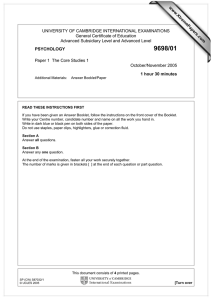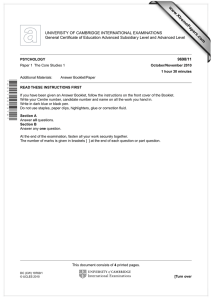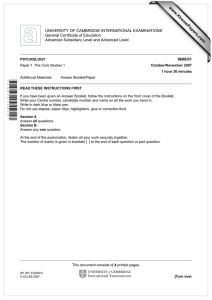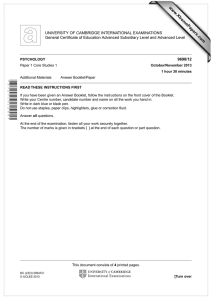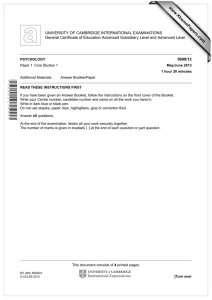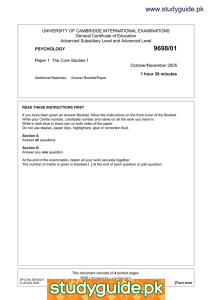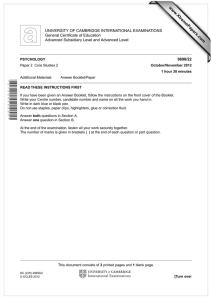www.XtremePapers.com
advertisement
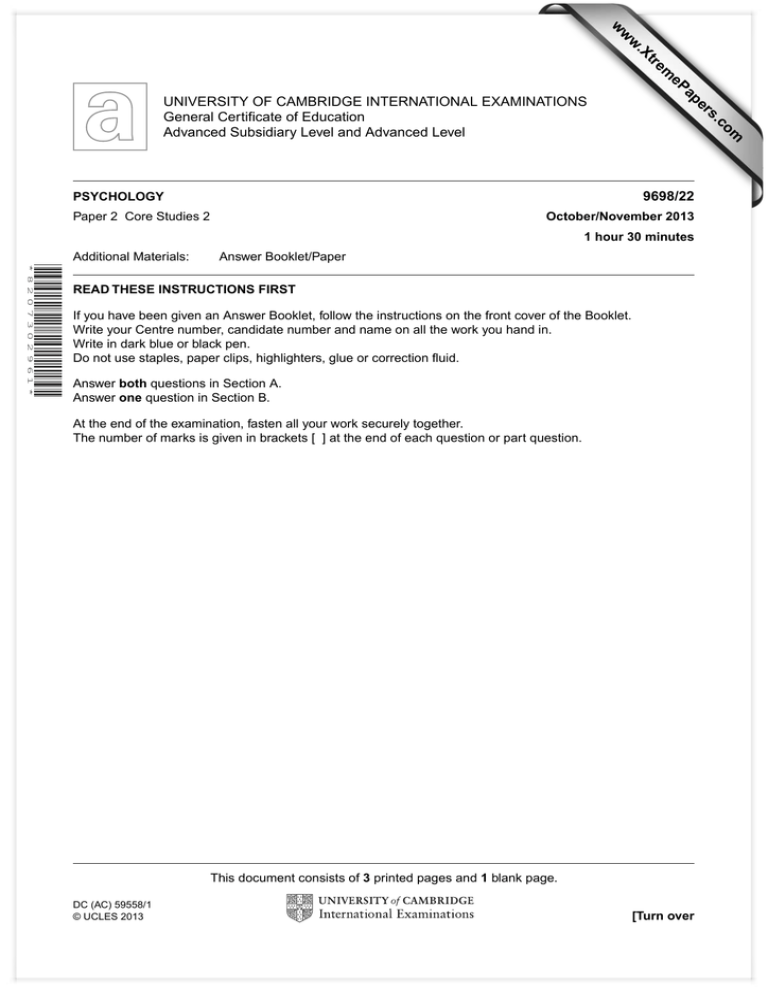
w w ap eP m e tr .X w om .c s er UNIVERSITY OF CAMBRIDGE INTERNATIONAL EXAMINATIONS General Certificate of Education Advanced Subsidiary Level and Advanced Level 9698/22 PSYCHOLOGY Paper 2 Core Studies 2 October/November 2013 1 hour 30 minutes Additional Materials: Answer Booklet/Paper * 8 2 0 7 3 0 2 9 6 1 * READ THESE INSTRUCTIONS FIRST If you have been given an Answer Booklet, follow the instructions on the front cover of the Booklet. Write your Centre number, candidate number and name on all the work you hand in. Write in dark blue or black pen. Do not use staples, paper clips, highlighters, glue or correction fluid. Answer both questions in Section A. Answer one question in Section B. At the end of the examination, fasten all your work securely together. The number of marks is given in brackets [ ] at the end of each question or part question. This document consists of 3 printed pages and 1 blank page. DC (AC) 59558/1 © UCLES 2013 [Turn over 2 Section A (50 marks) Answer both questions in this section. 1 Billington et al (empathising and systemising) conducted a snapshot self report study to investigate cognitive style and entry into physical sciences and humanities. An alternative way to investigate this would be to conduct a longitudinal study of children and their eventual choice of subject at university. (a) Outline the snapshot method and describe how it was used in Billington et al’s study. [5] (b) Design an alternative study to the Billington et al study using the longitudinal method and describe how it could be conducted. [10] (c) Evaluate this alternative way of studying empathising and systemising in practical and ethical terms. [10] 2 Schachter and Singer carried out a laboratory experiment on male university students to investigate the two factor theory of emotion. (a) What is meant by the term ‘generalisations’? [2] (b) Describe one control used by Schachter and Singer in their study. [3] (c) Discuss the strengths and weaknesses of making generalisations from the study by Schachter and Singer. [10] (d) Discuss the extent to which the conclusions reached by Schachter and Singer are reductionist. [10] © UCLES 2013 9698/22/O/N/13 3 Section B (20 marks) Answer one question from this section. 3 (a) Outline what is meant by nature and nurture in psychology. [2] Using the studies from the list below, answer the questions which follow. Bandura et al (aggression) Held and Hein (kitten carousel) Maguire et al (taxi drivers) (b) Describe what each of these studies tells us about the importance of nurture to development. [9] (c) What are the problems for psychologists when investigating whether behaviour is due to nature or nurture? [9] 4 (a) Outline what is meant by the ‘individual differences approach’ in psychology. [2] Using the studies from the list below, answer the questions which follow. Rosenhan (sane in insane places) Veale and Riley (mirror gazing) Thigpen and Cleckley (multiple personality disorder) (b) Describe how the data were collected in each of these studies. [9] (c) What are the advantages of investigating individual differences? [9] © UCLES 2013 9698/22/O/N/13 4 BLANK PAGE Permission to reproduce items where third-party owned material protected by copyright is included has been sought and cleared where possible. Every reasonable effort has been made by the publisher (UCLES) to trace copyright holders, but if any items requiring clearance have unwittingly been included, the publisher will be pleased to make amends at the earliest possible opportunity. University of Cambridge International Examinations is part of the Cambridge Assessment Group. Cambridge Assessment is the brand name of University of Cambridge Local Examinations Syndicate (UCLES), which is itself a department of the University of Cambridge. © UCLES 2013 9698/22/O/N/13
